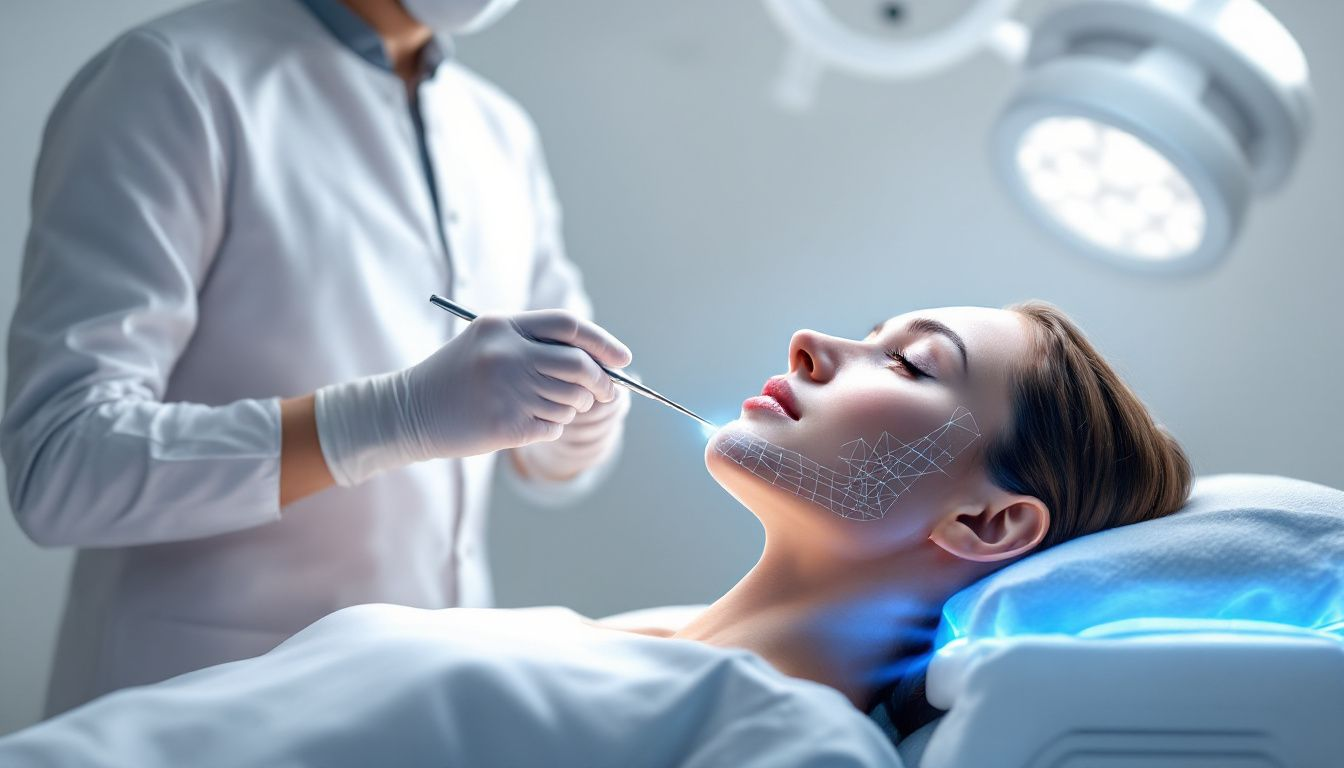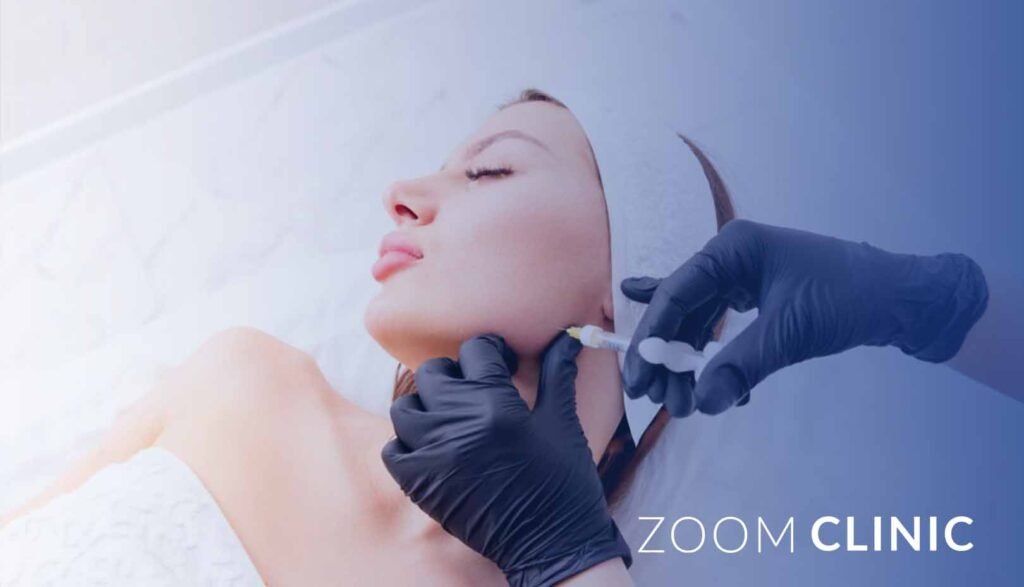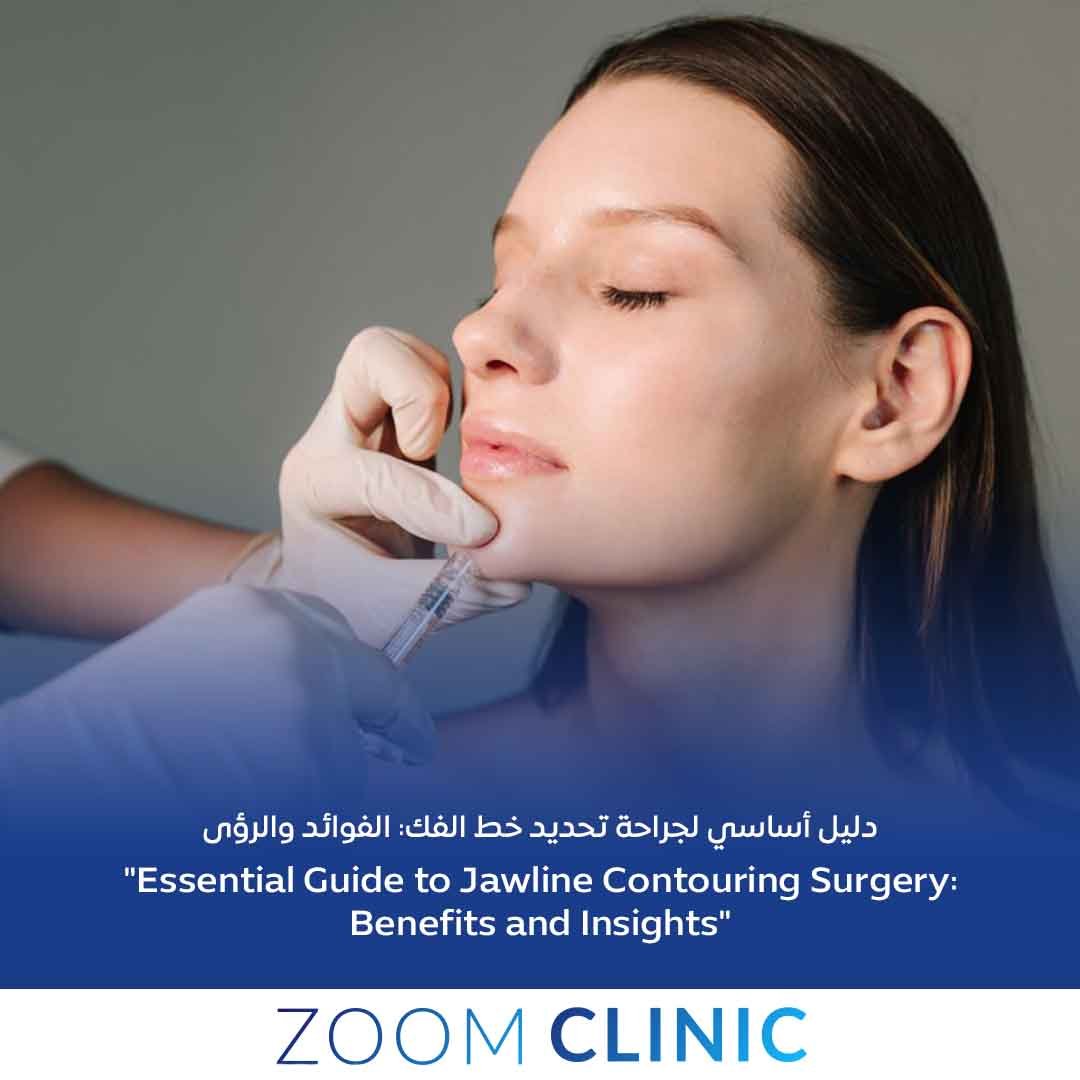Curious about jawline contouring surgery? This procedure reshapes the jawbone to improve your facial harmony. Let’s dive into the process, benefits, recovery, and costs.
جدول المحتويات
Key Takeaways
- Jawline contouring surgery reshapes the jawbone to enhance facial aesthetics, offering solutions for various jawline profiles.
- Candidates must be in good health with realistic expectations; preparation involves medical evaluations and lifestyle changes prior to surgery.
- Post-operative care is vital for recovery, with risks including bleeding and infection; selecting an experienced surgeon minimizes complications.
Understanding Jawline Contouring Surgery

Jawline contouring surgery is a specialized type of plastic surgery designed to reshape the jaw bone to improve the appearance of the jawline. This sophisticated procedure can include removing excess bone or adding volume to create a more defined jawline. Whether you’re looking to achieve a slimmer face shape or a more feminine jawline profile, jaw contouring surgery offers a solution tailored to your aesthetic goals.
The primary aim of jawline contouring surgery is to enhance the overall balance and shape of the face, providing a more harmonious look. This procedure not only improves the jawline but also contributes to refined facial aesthetics, making a significant difference in one’s appearance.
In essence, jawline contouring surgery is a tool for those seeking to enhance their facial features and achieve a well-defined jawline. Understanding the fundamentals of this procedure allows you to see how it might fit into your personal aesthetic journey.
How Jawline Contouring Surgery Works
Jawline contouring surgery employs various techniques to achieve desired results. These include V-line osteotomies, chin height reduction, T osteotomies, and sliding genioplasty, each tailored to specific needs. Incisions are typically made inside the mouth, minimizing visible scarring and ensuring a more discreet healing process. Additionally, v line jaw surgery is an option for those seeking a more defined facial structure.
Patients undergoing jawline surgery are generally under general anesthesia to ensure comfort throughout the procedure. Post-surgery, patients are closely monitored in a recovery room to ensure a safe and smooth recovery process. The meticulous care taken during and after the jaw surgery underscores the importance of hygiene and safety protocols in minimizing potential complications such as bleeding, infection, nerve damage, and scarring.
Knowing the intricate workings of jawline contouring surgery demystifies the process and highlights its safety and effectiveness when performed by experienced surgeons.
Ideal Candidates for Jawline Contouring
Are you a good candidate for jawline contouring surgery? This procedure is ideal for individuals who are unhappy with the shape or size of their jaw and are in good health. Common candidates include those with a square jaw, individuals seeking a V-line jaw, and non-smokers. If you possess weak, asymmetrical, or overly prominent jawlines, this surgery could be beneficial for you.
Ideal candidates for jawline contouring surgery should be in good overall health and have realistic expectations about the outcomes. This involves realizing that while the procedure can significantly enhance jawline definition and facial balance, it is not a magic cure-all and may require realistic goal-setting.
Assessing these factors helps determine if jawline contouring surgery is the right step toward achieving your desired facial aesthetics. With the right mindset and health status, you can be well on your way to a more defined and balanced jawline.
Preparing for Jawline Contouring Surgery
Preparing for jawline contouring surgery is crucial for optimal results and minimizing risks. Candidates must undergo a comprehensive medical evaluation, discussing underlying conditions and current medications with their surgeon. This step identifies any potential health issues that could affect the surgery or recovery process.
Lifestyle adjustments are also necessary. Patients should stop smoking and drinking alcohol at least two weeks before the surgery. Additionally, avoiding blood-thinning medications is important to reduce the risk of bleeding during the procedure.
A thorough consultation with the surgeon provides detailed pre-operative instructions tailored to each patient. This personalized approach ensures that you are fully prepared for the surgical procedures, setting the stage for a smooth and successful surgery.
The Jawline Contouring Procedure

The jawline contouring procedure involves accessing the mandible (lower jaw) to achieve the desired jaw contouring effects. Small incisions are typically made inside the mouth, which helps to minimize visible scarring and promote a more discreet healing process. This technique ensures that the surgical intervention remains largely invisible once fully healed.
Various methods can be employed to reshape and enhance the jawline, including the use of silicone implants or fat grafting. These techniques are chosen based on the specific needs and goals of the patient, ensuring a personalized approach to achieving a more defined jawline.
Knowing the steps involved in the jawline contouring procedure demystifies the process and instills confidence in the surgical journey toward enhanced facial aesthetics.
Post-Operative Care and Recovery
Post-operative care is a crucial component of the jawline contouring surgery process. Patients may experience mild swelling, which typically resolves within several weeks. Wearing a compression garment during this period can help reduce swelling and support the healing process.
Managing discomfort is another important aspect of recovery. Pain medication and cold compresses can help alleviate post-treatment pain. Patients should follow a soft, non-chew diet to facilitate healing. Additionally, keeping the head elevated during sleep and icing the area can further aid in reducing swelling.
Recovery time varies, but most patients can return to their daily activities within one to two weeks. Light walking is encouraged shortly after surgery, but strenuous activities should be avoided to ensure proper healing.
Risks and Complications
Jawline contouring surgery, like any surgical procedure, carries potential risks and complications. These can include excessive bleeding, infections, and nerve damage. Scarring is also a possibility, though incision sites are typically chosen to minimize visibility.
Choosing a highly skilled surgeon is crucial in reducing these risks. An experienced surgeon will have the expertise to minimize complications and ensure a safer surgical experience.
Being aware of these risks and how to mitigate them helps in making an informed decision about undergoing jawline contouring surgery. With the right surgeon and proper care, the potential for complications significantly reduces.
Long-Term Results and Maintenance
The results of jawline contouring surgery are often long-lasting and can be permanent. However, factors such as aging and lifestyle choices can influence the longevity of these results.
Post-operative care is essential in maintaining the new jawline. Patients can expect a natural and softer appearance after surgery, contributing to a more balanced facial look. Regular follow-ups and a healthy lifestyle can help sustain the enhancements achieved through the procedure.
Cost of Jawline Contouring Surgery
The cost of jawline contouring surgery can vary significantly depending on several factors.
In metropolitan areas like NYC, the procedure can cost between $6,000 and $15,000, with some package specials starting at $3,000.
Factors influencing the cost include:
- The surgeon’s experience
- The location of the surgery
- The extent of the procedure
- The type of anesthesia used
The type of facility where the surgery is performed also impacts the price. Accredited hospitals generally charge more than smaller clinics. Being aware of these cost factors helps you budget and plan for your surgery effectively.
Choosing the Right Surgeon for Jawline Contouring

Selecting the right surgeon is paramount for achieving optimal results in jawline contouring surgery. Look for surgeons with a strong background in aesthetic and reconstructive surgery procedures of the head and neck. Extensive experience and positive patient feedback are key indicators of a surgeon’s capability.
Consider the surgeon’s specialization in facial plastic surgery and oral and maxillofacial surgery, as these areas of expertise are crucial for successful jawline contouring and facial surgeries. Prioritizing these factors ensures you choose a qualified professional who can deliver the desired results.
Summary
Jawline contouring surgery offers a transformative solution for those seeking a more defined and balanced facial appearance. From understanding the procedure and preparing for surgery to post-operative care and long-term maintenance, this comprehensive guide has provided you with the essential information needed to make an informed decision.
Embrace the journey towards enhanced facial aesthetics with confidence. With the right preparation and a skilled surgeon, jawline contouring surgery can help you achieve the well-defined jawline you’ve always desired.
Get the special offer today from Zoom Clinic
Read Also:
Understanding Chin Augmentation Surgery
Mini Facelift vs Full Facelift
The Benefits of a Deep Plane Facelift
Frequently Asked Questions
How much does surgical jaw contouring cost?
Surgical jaw contouring generally costs between $6,000 and $15,000, with variations based on the surgeon’s experience and procedure complexity. It’s essential to consider these factors when budgeting for the surgery.
How much does jawline shaping cost?
Jawline shaping through filler injections typically costs between $1,000 and $3,400, depending on factors like the type of filler and amount needed. It’s essential to consult with a professional to determine the specific costs for your desired outcome.
How long does jaw contouring last?
Jaw contouring results from hyaluronic acid fillers typically last up to 18 months, though the visible effects may diminish sooner. Regular maintenance may be needed to preserve the desired appearance.
What is jawline contouring surgery?
Jawline contouring surgery is a plastic surgery procedure designed to reshape the jawbone for a more aesthetically pleasing jawline. This transformation can significantly enhance facial harmony and determination.
Who is an ideal candidate for jawline contouring surgery?
An ideal candidate for jawline contouring surgery is someone in good health with weak, asymmetrical, or overly prominent jawlines, and who maintains realistic expectations about the results.


